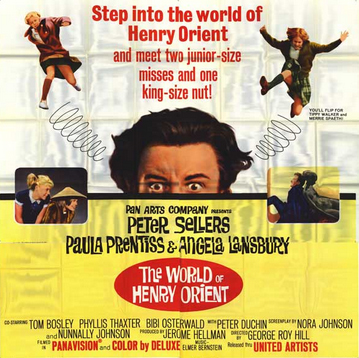Here's new contributor Diana D. Drumm to with a trip back to a film that opened today in 1964...

We open at the 1964 Cannes Film Festival, with all of its bubbles and laughter and cinema. A jury, including the likes of Fritz Lang and Charles Boyer, peer at a roster featuring now-classics The Umbrellas of Cherbourg and The Pumpkin Eater alongside cult favorite The World of Henry Orient... Oh, you haven’t heard of The World of Henry Orient?
Well, that isn’t so surprising, even considering its headliner, the late great Peter Sellers, it’s been lost to TCM and cult nostalgists. In terms of Sellers’s filmography, it’s sandwiched between two biggies -- Dr. Strangelove and A Shot in the Dark (this loaded schedule along with a marriage to Swedish bombshell Britt Ekland would lead to his first major heart attack in 1964).
Sellers stars at the eponymous “Henry Orient”, a famous pianist based on the dry actor-musician-wit Oscar Levant (you know, Gene Kelly’s friend in An American in Paris) who is being stalked *ahem* pursued *ahem* by two teenage fangirls throughout Manhattan from the Upper East Side down through Greenwich Village. [More...]

The film didn’t win any major awards at the festival that year, but gosh, imagine the champagne flowing at its Cannes premiere and the glamour of Sellers and Ekland showing up arm-in-arm as bulbs flash and a gaggle of teenage girls grasping and grabbing at the railings for a glimpse beyond the panache. (Coincidentally enough, The Life and Death of Peter Sellers would premiere at Cannes 40 years later.)
Directed by a transitioning-from-TV George Roy Hill, The World of Henry Orient was unleashed weeks before stateside (March 19th at Radio City Music Hall, to be exact) and received warmly by critics, including the regularly curmudgeonly Bowsley Crowther who called it
one of the most joyous and comforting movies about teenagers that we've had in a long time.”
Based off of the Nora Johnson (daughter of writer-director-producer Nunnally) novel, two prep school girls Gil and Val (played by relative newcomers Merrie Spaeth and Tippy Walker, unfortunately both were barely heard from again) creep after professional pianist/amateur lothario Henry Orient and hijinks abound to the chagrin of their parents (Val’s parents are played by the indomitable Angela Lansbury and sweethearted Tom Bosley) and Orient’s married conquest (played by Paula Prentiss, so 1960s) but to the cheer and applause of the audience. Literally running into Orient on the street and falling madly deeply in love at him (at rather than with, as schoolgirls do), Gil and Val vow to devote their entire lives (“except during homework”) to the study of “the great and beautiful and wonderful” though debatably talented Henry Orient.

Sellers as Orient encapsulates the dual attraction and repulsion we hold for those early questionable school-age crushes, with his purported musical talent, his mustachioed and flippy haired arrogance, his oilily charming come-ons, his paranoia peaking on comic levels. While being confronted by Val’s mother, who uncovers her daughter’s diary and suspects some foul play, Henry Orient hums out, “You’re a nymph with a sultry voice,” to which she swoons slightly. [Side note: What I wouldn’t give to be able to say that to Angela Lansbury or be told that by Peter Sellers… Excuse the fangirl melting.] As an object of affection, he still stands on a pedestal, but that height isn’t quite as pronounced as these girls first gathered and his stance becomes a bit wobbly as the film plays on.
Similarly, Spaeth and Walker capture youthful exuberance -- the type beyond knee socks, pigtails, and early attempts at makeup and furs, the spirit of that “in-between” age one full of undashed illusions of grandeur and a very distinct romantic notion of limitless life. There’s nothing quite like the early blossoms of a beyond-imagination crush, that is before reality sets in and those lofty thoughts come crashing down… It’s a pseudo-knowledgeable innocence and optimism. Going through the day’s notes and findings from their “study” of Henry Orient, Gil hands Val his cigarette butt that she managed to get off of a waiter. Val looks at it wide-eyed and asks, “No filter?” Gil smilingly answers, “He’s not scared.” What wonderful, utter nonsense. And that’s what makes this film so great. It’s playful, it’s fun, it’s from a very small world of ages past (most likely entirely non-existent beyond Nora Johnson and her circles), reeking of its specificity with cigarette holders, loudly colored cocktail and day dresses paired with ill-fitting furs, and avant garde piano playing.
The Beatles had just landed, youth culture was ebbing out with a more persistent counter-culture on its way in (as evidenced by this story’s stage adaptation Henry, Sweet Henry losing out with contemporary critics in favor of Hair, as pointed out by William Goldman in The Season), and this film marked a wonderful, mythical in-between. 50 years on, The World of Henry Orient is not only a terrific time capsule of the early 1960s but our own youthful flirtations with adulthood and romance. Over-confident though unsure, these girls pursued their prey with bubblegum-fuelled exuberance and discovered more about themselves and the world at large along the way.
If you’re looking for a double feature...
 Michelle Williams & Kirsten Dunst in "Dick"
Michelle Williams & Kirsten Dunst in "Dick"Pair this film with its less cultured though more political parody-charged, could-be sequel Dick (1999), which is about two teens (Kirsten Dunst and Michelle Williams) who stumble into dogwalking jobs at the White House and fall head over heels for Richard Nixon (Dan Hedaya).